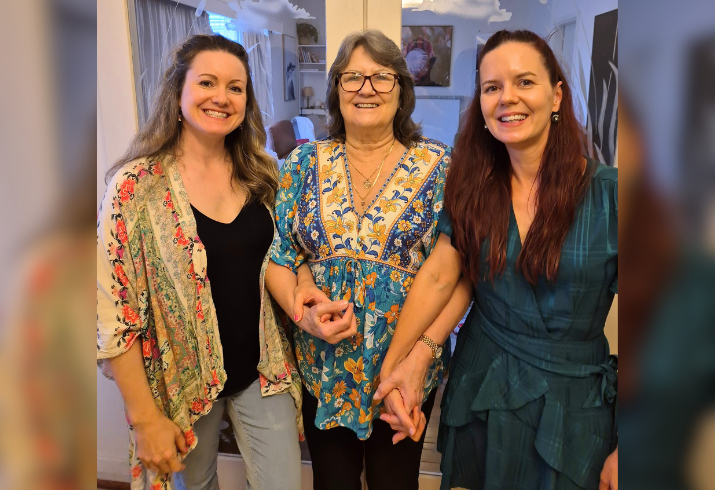Mel's looking on the bright side after preventative breast surgery
 (L-R) Michelle Haines, Jenny Hough and Melissa Holst
(L-R) Michelle Haines, Jenny Hough and Melissa Holst
Mel Holst's Mum, Jenny Hough, was diagnosed with breast cancer at the age of 65 and underwent lumpectomy and radiation therapy. However, five years later, she received the devastating news she had stage 2 ovarian cancer.
Jenny's cancer diagnoses led to genetic testing which uncovered she had the breast cancer gene 2 (BRCA2).
People who inherit the BRCA2 gene have increased risks of several cancers – most notably breast and ovarian cancer – and tend to develop cancer at younger ages.
With the knowledge their Mum had the BRCA2 gene and following advice from clinicians, Mel and her sister, Michelle Haines, underwent genetic testing of their own. The results changed Mel's life – she too had the BRCA2 gene.
"At the age of 44 and with our 12-year-old son, we knew we weren't going to have any more children," Mel said.
"I made the decision to go ahead with preventative surgery which included a laparoscopy to remove my ovaries and fallopian tubes."
Then just seven weeks ago, Mel underwent a bilateral mastectomy and had breast implants put in.
Fiona Stanley Hospital (FSH) Breast Assessment Unit (BAU) Clinical Nurse Consultant, Tamara Casey, said Breast Cancer Network Australia (BCNA) predicted 20,973 women and 221 men will be diagnosed with breast cancer in 2024.
"That means 58 people every day this year are receiving a diagnosis of breast cancer which will ultimately change their lives," Tamara said.
"To help support these patients, the FSH BAU offers a multidisciplinary service that diagnoses and treats breast cancer and breast related conditions for patients living across Western Australia.
"We offer further screening for Breast Screen WA patients, comprehensive assessment by our breast physician and breast surgeons, nurse led clinics to support patients during and post treatment, along with allied health services including psychology, physiotherapy and a dedicated medical imaging radiological department."
Pre-surgery Mel had an 80 per cent increased risk of getting breast cancer, now post-surgery, it's just a four per cent chance she will be diagnosed with breast cancer.
"Dr Fernandez and all the nurses at the FSH BAU really looked after me the whole way through the process," Mel said.
"It's a huge sense of relief and now I don't have to worry - I just get to enjoy my life with my family.
"My husband and I are treating ourselves with a trip to Broome for the first time this month – I'm looking forward to wearing my new green bikini with confidence!"
For Breast Cancer Awareness month this October, the FSH BAU team put together a ‘field of women’ visual display at the front entrance of the hospital. Pink represents those who have survived breast cancer, blue for the men who have been diagnosed and white for those who passed away.
Keep up to date with our news and achievements
Find out more on Facebook (external site) or LinkedIn (external site)

